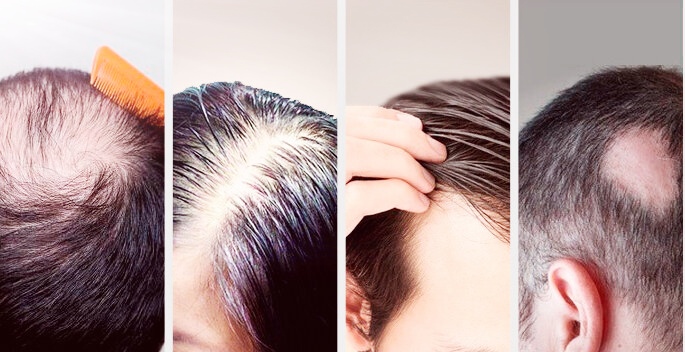
Hair loss cause and symptoms. Hair loss natural remixes and how to use them.
Hair loss, also known as alopecia, is a common condition that affects both men and women, and can be caused by a variety of factors. It can manifest in different forms, from thinning of hair to complete baldness. In this article, we will discuss the causes and symptoms of hair loss, as well as natural remedies that may help promote hair growth.
Causes of hair losing
There are many different factors that can cause hair loss, including genetics, hormonal imbalances, medications, medical conditions, and environmental factors. Some of the most common causes of hair losing include:
Genetics:
Hair loss can be hereditary, meaning it is passed down from one or both parents. This type of hair losing is known as androgenetic alopecia, and is more commonly known as male or female pattern baldness.
Hormonal imbalances:
Hormonal changes can cause hair loss in both men and women. For example, women may experience hair loss during menopause or pregnancy, while men may experience hair loss due to a decrease in testosterone levels.
Medications:
Certain medications can cause hair loss as a side effect. Chemotherapy drugs, for example, often lead to temporary hair losing , while other medications such as blood thinners and antidepressants can also cause hair loss.
Medical conditions:
Certain medical conditions can cause hair loss, including autoimmune disorders, such as alopecia areata, and scalp infections, such as ringworm.
Environmental factors:
Exposure to certain environmental factors, such as pollution and UV radiation, can also contribute to hair losing .
Symptoms
The symptoms of hair losing can vary depending on the cause of the condition. In some cases, hair losing may be sudden and rapid, while in other cases, it may occur gradually over time. Some of the most common symptoms of hair loss include:
Thinning hair:
This is the most common symptom of hair losing . Hair may appear thinner, or may become patchy in some areas.
Bald patches:

In some cases, hair loss can result in bald patches on the scalp or other areas of the body.
Itching or burning:
Some people may experience itching or burning sensations on the scalp or affected areas.
Hair shedding:
Hair shedding is a natural process, but excessive shedding can be a sign of hair loss.
Changes in hair texture:
Hair may become dry, brittle, or rough in texture as a result of hair loss.
Natural Remedies
There are several natural remedies that may help promote hair growth and prevent hair loss. Here are some of the most effective ones:
Aloe vera:
Aloe vera contains enzymes that help nourish and moisturize the scalp, which can help promote hair growth. Apply aloe vera gel directly to the scalp, leave it on for 30 minutes, and then rinse with lukewarm water.
Coconut oil:
Coconut oil is rich in fatty acids that help nourish the hair and scalp, and can help prevent hair loss. Apply coconut oil to the scalp and hair, and leave it on for at least 30 minutes before washing it off with shampoo.
Onion juice:
Onion juice contains sulfur, which can help promote hair growth and prevent hair loss. Apply fresh onion juice to the scalp, leave it on for 15 minutes, and then rinse with a mild shampoo.
Egg mask:
Eggs are rich in protein, which can help strengthen hair and prevent hair loss. Mix one egg with two tablespoons of olive oil, apply it to the hair and scalp, and leave it on for 30 minutes before washing it off with shampoo.
Green tea:
Green tea contains antioxidants that can help promote hair growth and prevent hair loss. Brew a cup of green tea, let it cool, and then apply it to the scalp. Leave it on for an hour before washing it off with lukewarm water.
Fenugreek seeds:
Fenugreek seeds are rich in protein and nicotinic acid, which can help strengthen hair and prevent hair loss. Soak two tablespoons of fenugreek seeds overnight, and then grind them into a paste. Apply the paste to the scalp, leave it on for 30 minutes, and then rinse with warm water.
Rosemary oil:
Rosemary oil has been shown to increase hair growth and thickness. Mix a few drops of rosemary oil with a carrier oil, such as coconut oil or olive oil, and massage it into the scalp. Leave it on for at least 30 minutes before washing it off with shampoo.
Apple cider vinegar:
Apple cider vinegar helps balance the pH of the scalp, which can promote healthy hair growth. Mix equal parts of apple cider vinegar and water, and apply it to the scalp after shampooing. Leave it on for a few minutes before rinsing it off with water.
Biotin supplements:
Biotin, also known as vitamin H, is essential for healthy hair growth. Taking biotin supplements can help prevent hair loss and promote hair growth.
Healthy diet:
Eating a balanced diet rich in vitamins and minerals can also help prevent hair losing and promote healthy hair growth. Foods rich in vitamin C, iron, and zinc, such as leafy greens, berries, nuts, and eggs, are particularly beneficial for hair health.
In addition to these natural remedies, it is important to maintain good hair care habits, such as avoiding harsh styling products and treatments, using a gentle shampoo and conditioner, and avoiding tight hairstyles that pull on the hair.
Conclusion
Hair loss is a common condition that can be caused by a variety of factors. While some causes of hair loss, such as genetics and medical conditions, may require medical treatment, there are several natural remedies that may help promote hair growth and prevent hair loss. A healthy diet and good hair care habits are also important for maintaining healthy hair. If you are experiencing hair loss, it is important to speak with a healthcare professional to determine the underlying cause and appropriate treatment options.
Hair loss treatment options vary depending on the underlying cause of the hair loss. Here are some of the most common treatments for hair loss:
Medications:
There are several medications available for the treatment of hair losing, including minoxidil and finasteride. Minoxidil is a topical medication that is applied directly to the scalp and is available over-the-counter. Finasteride is an oral medication that is available by prescription only. Both medications are FDA-approved for the treatment of male pattern baldness and may also be used to treat other types of hair loss.
Hair transplant surgery:
Hair transplant surgery involves transplanting healthy hair follicles from one area of the scalp to another area that is experiencing hair loss. The procedure is typically done under local anesthesia and may require several sessions to achieve the desired result.
Laser therapy:
Low-level laser therapy (LLLT) uses lasers or light-emitting diodes (LEDs) to stimulate hair growth. LLLT is a non-invasive treatment that is typically done in a clinic setting.
Platelet-rich plasma (PRP) therapy:
PRP therapy involves injecting a concentrated solution of platelets from the patient’s own blood into the scalp to stimulate hair growth. The procedure is typically done in a clinic setting and may require several sessions.
Scalp micropigmentation:
Scalp micropigmentation involves tattooing the scalp to create the appearance of hair follicles. The procedure is typically done in a clinic setting and may require multiple sessions.
It is important to note that not all hair losing can be treated, and some treatments may not be effective for all types of hair. It is important to speak with a healthcare professional to determine the underlying cause of the hair losing and appropriate treatment options. In some cases, a combination of treatments may be necessary to achieve the desired result. Additionally, it is important to maintain good hair care habits and a healthy diet to promote healthy hair growth.


















